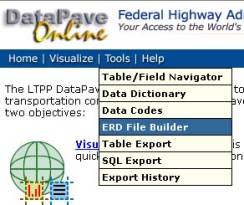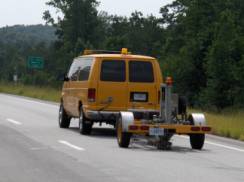U.S. Department of Transportation
Federal Highway Administration
1200 New Jersey Avenue, SE
Washington, DC 20590
202-366-4000
Federal Highway Administration Research and Technology
Coordinating, Developing, and Delivering Highway Transportation Innovations
|
LTPP News This newsletter is an archived publication and may contain dated technical, contact, and link information. |
|
| Publication Number: FHWA-HRT-06-131 Date: Fall 2006 |
Publication Number:
FHWA-HRT-06-131
Issue No: Vol. 2 No. 4 Date: Fall 2006 |
| Email Distribution List |
|
| Contact |
Customer Service
|
Home improvement television shows have inspired many people to take on the challenge of performing improvement projects themselves. People with little or no training in the construction trade are attempting everything from replacing their garbage disposal to completely remodeling their kitchen or creating the perfect bathroom spa. While these do-it-yourselfers may have a vision of the project's end result, achieving that result is not always easy, in large part because of all the choices that must be made: What type of garbage disposal to purchase? Is granite, laminate, or concrete best for countertops? Will a steam shower in the bathroom be affordable?
These are just a few of the questions people ask during home improvement projects. To find answers to these questions and identify the materials necessary for a project, most people know they can turn to home improvement stores. But, how can do-it-yourselfers ensure they choose the right materials and get the best price while still achieving their project vision in a timely manner? While a few people might hire a consultant, most people turn to the customer service center at their local home improvement store.
By now, you are probably asking, "What does home improvement have to do with pavement and the Long-Term Pavement Performance (LTPP) program?" The answer is this: just as home improvement stores hold an abundance of home improvement information, the LTPP database, which includes the Standard Data Release (SDR) and DataPave Online, is a warehouse of pavement performance information. Also, just as home stores have nearly everything needed to build a house from the foundation to the roof, the LTPP database has nearly everything a data analyst needs to build models to improve pavements. In addition, all the materials in a home improvement store and all the information in the LTPP database means nothing if you do not know where to find what you need.
To help locate necessary information, users of LTPP data can contact the LTPP Customer Support Service Center to find specific data elements from the hundreds of tables in the LTPP database. This will help prevent researchers from starting a project with all the information they thought was available and then reporting inconclusive results due to insufficient data, only to find out that much more data was available in a different part of the database.
One reason why a researcher might not locate all of the available data is that, like many home stores, the LTPP database is large and complex, with more than 12 modules, 500 tables, 12,500 fields, 4,300 distinct elements, and 170 million records. In addition, the LTPP database, like the stores, has its disadvantages if you are searching on your own: Although they both probably have what you need, finding it by yourself can take time, and after you have searched, you still might need to place a special order.
Another reason why users might have trouble finding LTPP data, especially if they are looking in the SDR or DataPave Online, is because these two portals to the database do not contain all of the available LTPP data and information. As a part of its mission to make a full spectrum of information available to customers, the LTPP program also maintains warehouses in Maryland, Nevada, Tennessee, and Virginia that contain items such as distress photos and falling weight deflectometer time history, raw traffic, and raw weather station data.
The Federal Highway Administration (FHWA) created the Customer Support Service Center to save researchers time and money in searching for data. The center can fulfill requests and help requestors quickly get the right information from the right places. The center is part of the LTPP program's commitment to ensure data quality and help researchers retrieve the appropriate data for their projects. The representatives who staff the center are backed by engineers and database professionals.
If you need to use LTPP data, we are here to provide technical assistance and guide you to the right information for your analyses.
Future newsletters will offer briefs on specific uses of the database and the locations of a range of data elements. If you need data or have questions about data you already have, contact the LTPP Customer Support Service Center at 202–493–3035 or by e-mail to ltppinfo@fhwa.dot.gov. For information about the LTPP database and its structure, contact Eric Weaver at 202–493–3153 or eric.weaver@fhwa.dot.gov.
DataPave Online-ERD File Builder
The LTPP program has enhanced the DataPave Online Web site (www.datapave.com). The improved site enables users to download longitudinal road profile measurements for all LTPP sections in ERD file format for data analysis. Developed by the Engineering Research Division (ERD) at the University of Michigan Transportation Research Institute, the ERD format facilitates automated plotting of simulation data, experimentally measured data, and data from various analysis programs.

Screen capture of the ERD File Builder.
Using a tool called the ERD File Builder, visitors to the Web site can list dates when profile measurements are made on LTPP sections along with information on the profile measuring equipment used for each monitoring event. This information permits users to select desired profile data and convert it to standard ERD file format for analysis. The LTPP program believes that allowing real-time export of profile data in ERD format from the most current LTPP SDR will help researchers and pavement engineers make better use of the LTPP database for ongoing and future pavement performance analysis and research.
Falling Weight Deflectometers: Transferring the Technology
For the LTPP program, technology transfer is more than just sharing data and information. For example, the LTPP program recently gave four of its falling weight deflectometer (FWD) vehicles to FHWA's Western Federal Lands Highway Division (WFLHD), Central Federal Lands Highway Division (CFLHD), Turner-Fairbank Highway Research Center in McLean, VA, and the National Center for Asphalt Technology (NCAT) in Auburn, AL.

Ray Brown, director of NCAT (left), is shown receiving FWD keys from Brandt Henderson, LTPP regional field data collection and equipment manager (right).
The FWD is a nondestructive testing device that practitioners can use during structural testing for pavement rehabilitation, investigations, design, and research. The FWD imparts a dynamic load to the pavement surface that is similar to that of a single, heavy, moving wheel load. The device then measures the resulting pavement deflection. Practitioners can use this deflection data, combined with pavement layer thickness data, to determine the in situ resilient modulus of layers within a pavement structure and analyze the remaining service life of a pavement.
"The FWD has been a very important piece of equipment to the LTPP program. It has allowed the structural monitoring of thousands of pavement test sections across North America since 1988 and contributed to the largest pavement deflection dataset in the world," notes FHWA's Eric Weaver. "As the LTPP program matures and test sections have been phased out of the program, there is less of a demand for the equipment. The LTPP program therefore felt that it would be mutually beneficial to transfer the technology to others that can use it."
Prior to the technology transfer, CFLHD had contracted for FWD services on an as-needed basis, primarily reserving use of the FWD for projects that involved many miles of testing. CFLHD now will have the opportunity to use FWD testing for smaller activities, such as research, quality assurance, and forensic analysis. The FWD will get its first use in Mesa Verde National Park in Colorado, where CFLHD is planning to rehabilitate the main entrance road to the park, where several areas of soft subgrade soil are known to exist. "The goal of the FWD testing will be to delineate the limits of this soft subgrade," explains Mike Voth of CFLHD. "Overall project cost efficiency will be improved by developing a design solution for the soft subgrade areas separate from the remaining areas of the project, where better soil conditions exist."
After completing its work in Colorado, CFLHD plans to use the FWD to evaluate pavement performance expectations on two recently completed projects in Utah's Zion National Park and Cedar Breaks National Monument.
NCAT will use the FWD at its test track, a 2.7-kilometer (1.7-mile) full-scale flexible pavement test facility. "The FWD will be an integral part of the 2006–2009 research cycle, which will feature 46 test sections sponsored by various State departments of transportation and FHWA," says NCAT's David Timm. "It will aid in seasonal and temporal characterization of the test sections, measure structural integrity as a function of distress, and provide vital inputs for mechanistic-empirical pavement design validation and calibration." NCAT also will use the FWD in conjunction with embedded pavement instruments to validate pavement response models.

NCAT's new FWD vehicle on the road.
WFLHD already has used its FWD for testing on the Going-to-the-Sun Road in Glacier National Park in Montana to analyze the pavement's general condition and remaining service life and plan road repairs. WFLHD also used the FWD for testing on paved and gravel roads for the West Fork Road project in Montana. Prior to the technology transfer, WFLHD had used contractors to conduct FWD testing to help with the design of pavement overlay thicknesses, determine subgrade strengths, and delineate soft subgrade areas. "By owning this equipment, the cost for this type of testing will decrease and allow for it to be used more often for not only design purposes, but also for construction needs," says Gary Evans of WFLHD. The FWD also will aid in the future implementation of mechanistic-empirical pavement design methods. Other potential uses of the FWD include forensic analyses of pavements, studies of remaining service life, pavement performance modeling for pavement management systems, and analyses of weakening effects of road thaw to determine load restrictions.
For more information on using FWDs, contact Eric Weaver at 202–493–3153 or eric.weaver@fhwa.dot.gov.
New Regional Support Contracts
The LTPP program awarded four new regional support contracts on June 30, 2006. The contracts have a 12-month base period with four 12-month option years. The objective of these contracts is to provide technical services in support of the development and conduct of the LTPP studies established by the Strategic Highway Research Program (SHRP).
Each regional support contractor is responsible for collecting, processing, and providing data quality at the test sections within the geographical boundaries of the designated LTPP region. The contracts also include a task order for collecting data for FHWA’s Highways for LIFE program.
LTPP State Coordinators Retire
Two key advocates for the LTPP program recently retired from the Colorado Department of Transportation and the Maryland State Highway Administration. Ahmad Ardani of Colorado and Albin Blazucki of Maryland have been involved with the LTPP program since the early SHRP days and served as their agencies’ LTPP State coordinators. Combined, they leave with 40 years of LTPP experience!
The LTPP program thanks Mr. Ardani and Mr. Blazucki for their effort and support all these years. Their ability to communicate to upper management the importance of their agencies’ participation in the various activities of the program allowed the LTPP program office to move forward in its data collection activities. It is people like these two men who shape the legacy of the LTPP program.
Frequency of the LTPP Newsletter Is Changing
Starting this fall, FHWA will publish the LTPP Newsletter four times a year instead of six, in fall, winter, spring, and summer. Check our next issue for information on our new ESALCalc software that calculates equivalent single axle loads and for an update on the most recent LTPP profiler comparison rodeo being held this fall at the Minnesota Road Research facility.
Recently Published LTPP Reports
2006 LTPP Product List (FHWA-HRT-06-119)
The LTPP program is a 20-year study of in-service pavements designed to provide the data required for understanding how and why pavements perform the way they do. The U.S. Congress mandated the LTPP program to "prepare products and deliver them to the appropriate customers in a rational, organized manner." To fulfill this mandate, the LTPP program developed this summary, which details LTPP products for new and reconstructed pavements, traffic loading and environmental effects, and national pavement performance data services.
Framework for LTPP Forensic Investigations, Final
Within the LTPP program, researchers have discussed the idea of forensic investigations for many years. A transportation practitioner would perform a forensic investigation after a test section has gone out of service or is scheduled for rehabilitation to examine the causes and mechanisms of distress. In cases where the test section was going out of study or was scheduled for rehabilitation for reasons other than pavement failure, practitioners would conduct forensic investigations to identify what worked and why. This document provides a framework for forensic investigations at LTPP test sections. The framework is intended to promote consistency and uniformity within the program and to ensure that maximum benefit is derived from the investigations. The word “framework” was purposely chosen over “plan” because no two test sections are alike, and therefore, a unique, detailed plan cannot be developed that applies to all LTPP test sections.
Verification of LTPP Virtual Weather Stations Phase I Report: Accuracy and Reliability of Virtual Weather Stations
(FHWA-RD-03-092)
Researchers in the LTPP program use two data sources to characterize the climatic conditions for each test section. For the majority of the test sections, researchers obtain data for nearby national weather stations from the National Climatic Data Center (NCDC) and use the data to compute estimated conditions for a virtual test section located at the same site as the actual test section. In addition, researchers use onsite instrumentation to obtain site-specific climate data for the test sections included in the Seasonal Monitoring Program and for the Specific Pavement Studies (SPS)-1, -2, and -8 project sites. This report documents a study to examine the reliability and accuracy of the LTPP climatic data. The study confirmed that accurate daily, monthly, and yearly estimates of climatic data for a project location can be derived by using the NCDC weather data for several nearby weather stations. The report also characterizes variations in climatic data.
Long-Term Pavement Performance Materials Characterization Program: Verification of Dynamic Test Systems With an Emphasis on Resilient Modulus (FHWA-RD-02-034)
As part of a materials characterization effort in the LTPP program, researchers developed a quality control/quality assurance procedure to verify the ability of laboratory equipment and personnel to perform LTPP Protocol P46 resilient modulus testing, which was documented in the 1997 report, LTPP Materials Characterization Program: Resilient Modulus of Unbound Materials (LTPP Protocol P46) Laboratory Startup and Quality Control Procedures (FHWA-RD-96-176). Since then, researchers have gained a great deal of experience in using the procedure. This report further expands the concepts and incorporates the lessons learned in the past few years. In addition, the report includes the procedures written in a more generic sense so their use can be more broadly applied in the materials characterization industry. While the procedures outlined in the report are principally intended to verify resilient modulus testing operations within a laboratory, readers can extend these concepts to other test procedures with little or no modification, which may benefit members of the broader community who are interested in the acquisition of accurate, repeatable results from dynamic test systems.
Long-Term Pavement Performance Inventory Data Collection Guide (FHWA-HRT-06-066)
The primary purpose of this data collection guide is to provide a uniform basis for data collection during long-term monitoring of the performance of pavement test sections under study by the LTPP program. The guide is a revision of chapter 2 of the 1993 LTPP Data Collection Guide. The inventory includes the data necessary to (1) identify a test section, (2) describe the geometric details of a test section’s construction and the material properties of its structural constituents, and (3) identify construction costs and the costs of subsequent maintenance and repairs before the long-term monitoring effort. These data are intended to describe the pavement test section when it was included in the LTPP study.
For more information on LTPP publications and products, visit the LTPP Library and Products Web sites at www.fhwa.dot.gov/pavement/ltpp/library.cfm and www.fhwa.dot.gov/pavement/ltpp/product.cfm.
For more information about the LTPP program, visit
www.fhwa.dot.gov/pavement/ltpp.